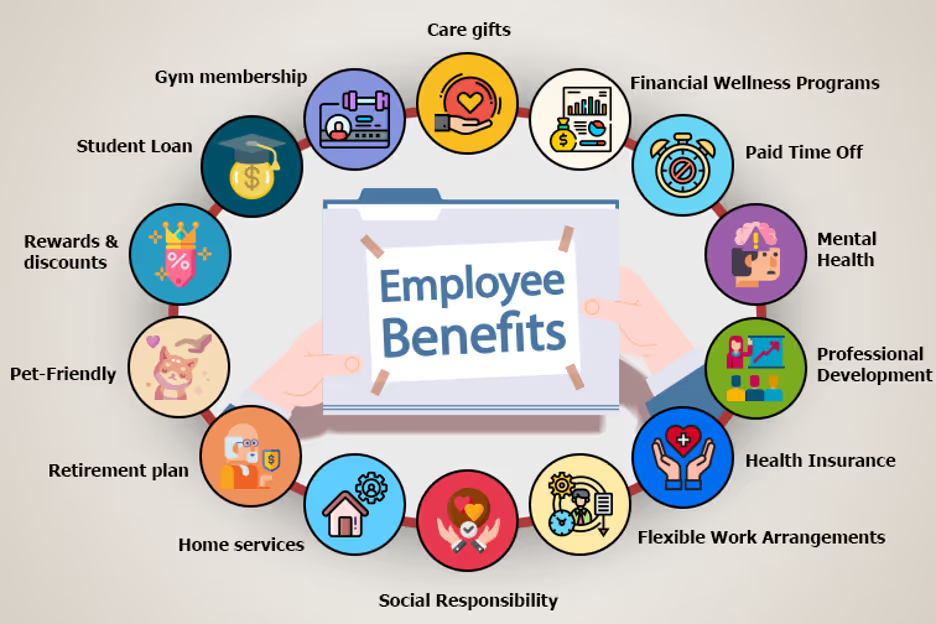What Are Employee Benefits?
Employee benefits are a set of employee-provided benefits provided to employees by companies. They can be used to compensate employees for the use of their own time or property, or they can provide health insurance, life insurance, and other financial assistance after retirement. Employee benefits come in many forms, but they are generally presented as a package that includes medical and health care coverage.
Employee benefits can also be referred to as employee benefits packages or sometimes as employee benefit plans. It is important to note that not all employers provide these benefits; however, most large companies offer some type of employee benefit plan.
There are three types of employee benefit plans: health care-only plans, short-term disability plans, and long-term disability plans (also known as LTD).
Importance of Employee Benefits
Employee benefits play a vital role in shaping the overall work experience and are highly valued by employees. Here are several key reasons why employee benefits are crucial for organizations:
I. Attracting and retaining top talent:
In today's competitive job market, organizations need to stand out to attract and retain the best talent. Offering comprehensive employee benefits is an effective way to differentiate themselves from competitors. Candidates often consider the benefits package as a significant factor when deciding between job offers. Robust benefits, such as health insurance, retirement plans, and unique perks, can be instrumental in attracting top talent and creating a positive employer brand.
II. Enhancing employee morale and job satisfaction:
Employee benefits contribute to higher job satisfaction and overall morale within the workforce. When employees feel supported and valued through benefits like health insurance, paid time off, and wellness programs, they are more likely to be satisfied with their jobs. This, in turn, leads to increased productivity, higher employee engagement, and a positive work culture.
III. Improving work-life balance
Achieving a healthy work-life balance is a top priority for many employees. Benefits like paid time off, flexible work arrangements, and family-friendly policies help employees manage their personal and professional commitments effectively. When employees have the opportunity to maintain a healthy balance, they experience reduced stress levels, increased job satisfaction, and improved overall well-being.
IV. Promoting overall employee well-being:
Employee benefits contribute to the physical, mental, and emotional well-being of employees. Health insurance benefits provide access to necessary medical care and preventive services, ensuring that employees can take care of their health needs. Wellness programs and employee assistance programs (EAPs) support employees in maintaining their mental and emotional well-being, addressing issues such as stress, work-life challenges, and personal difficulties. By investing in employee well-being, organizations create a supportive environment that fosters employee loyalty and commitment.
V. Increasing productivity and engagement:
Satisfied and engaged employees are more likely to be productive and contribute positively to the organization's success. When employees feel supported through comprehensive benefits, they are more motivated to perform at their best. Benefits that address employee needs, such as retirement plans or financial wellness programs, provide a sense of security and peace of mind, allowing employees to focus on their work without distractions. Moreover, when employees are engaged and satisfied, they are more likely to go the extra mile, collaborate effectively, and stay committed to the organization's goals.

Types of Employee Benefits
Different types of employee benefits play a crucial role in attracting and retaining talented individuals, as well as promoting their overall well-being. Let's explore each of these benefits in more detail:
1. Health insurance:
Health insurance is one of the most important benefits offered by employers. It provides coverage for medical expenses, including doctor visits, hospital stays, prescription medications, and preventive care. Understanding the different types of health insurance plans, such as Preferred Provider Organization (PPO) or Health Maintenance Organization (HMO), can help employees make informed decisions about their healthcare needs.
2. Retirement plans:
Retirement plans help employees save for their future financial security. These plans can come in various forms, such as 401(k) plans or Individual Retirement Accounts (IRAs). Employers may also offer matching contributions, where they contribute a certain percentage to an employee's retirement savings based on their own contributions.
3. Paid time off (PTO):
PTO refers to the time off granted to employees for various reasons, including vacation, personal reasons, or illness. It allows employees to take a break, recharge, and maintain a healthy work-life balance. Understanding the different types of time off policies, such as annual leave, sick leave, and parental leave, helps employees plan their time off effectively.
4. Disability insurance:
Disability insurance provides income protection in the event that an employee becomes disabled and is unable to work. It offers financial support to cover living expenses and medical costs during the disability period. Short-term and long-term disability insurance are common types of coverage provided by employer
5. Life insurance:
Life insurance provides a financial safety net for an employee's loved ones in the event of their death. It pays a lump sum or regular payments to the designated beneficiaries. Employers may offer basic life insurance coverage as well as options for employees to purchase additional coverage.
6. Employee assistance programs (EAPs):
EAPs are designed to support employees in managing personal and work-related challenges. They typically provide confidential counseling services, resources for mental health and well-being, and assistance with various life issues such as financial concerns, substance abuse, or family matters
7. Wellness programs:
Wellness programs aim to improve employees' overall health and well-being. They often include initiatives such as fitness challenges, health screenings, stress management programs, and educational resources on nutrition and healthy lifestyles. Wellness programs can contribute to a positive work environment and enhance employee morale and productivity.
8. Flexible spending accounts (FSAs):
FSAs allow employees to set aside pre-tax dollars to cover eligible healthcare expenses or dependent care costs. These accounts can provide significant tax savings and help employees manage their healthcare expenses effectively.
9. Stock options and equity:
Stock options and equity grants are often offered by companies, especially startups or established corporations, to provide employees with an opportunity to share in the company's success. These benefits can offer financial rewards if the company's stock value increases over time
10.Tuition reimbursement:
Tuition reimbursement programs support employees in continuing their education or pursuing professional development opportunities. Employers may partially or fully reimburse employees for eligible educational expenses, such as tuition fees, textbooks, or certification courses. This benefit promotes continuous learning and career advancement.
Understanding these different types of employee benefits can empower individuals to make informed decisions regarding their overall compensation package and take full advantage of the offerings provided by their employers.
Also Read: How Much Should Employer Spend on Benefits
How employee benefits improve the employee experience
here are some key points explaining how employee benefits improve the employee experience:
1. Financial Security
Employee benefits, such as health insurance, retirement plans (like 401(k)s), and even financial wellness programs, go a long way in providing employees with financial security. Health insurance, for example, shields employees from unexpected medical expenses, ensuring they can access necessary healthcare without incurring crippling costs. Retirement plans allow employees to save for their future, helping them envision a financially secure retirement. When employees feel financially secure, they are less distracted by financial worries, which can lead to increased focus and productivity at work.
2. Job Satisfaction
Job satisfaction is closely tied to the perception that the organization cares about its employees. Employee benefits serve as a tangible demonstration of this care. When employees see their employer investing in their well-being through benefits like health coverage, paid time off, and educational opportunities, they are more likely to feel valued and satisfied with their jobs. This satisfaction can lead to higher morale, better teamwork, and reduced turnover.
3. Work-Life Balance
Benefits like flexible work arrangements, parental leave policies, and wellness programs enable employees to strike a healthier work-life balance. Flexible schedules or remote work options, for instance, allow employees to attend to personal matters without compromising their job responsibilities. Wellness programs often include resources and incentives for maintaining physical and mental health, helping employees manage stress and avoid burnout. A better work-life balance not only improves employee well-being but also boosts job performance and longevity.
4. Talent Attraction and Retention
In today's competitive job market, a robust benefits package can be a powerful tool for attracting and retaining top talent. Prospective employees are more likely to choose an employer that offers attractive benefits, as these perks provide added value beyond salary. Moreover, once employees are onboarded, they are more likely to stay with a company that values their well-being. This reduces turnover, which is not only costly but also disruptive to an organization's operations and morale.
5. Employee Engagement
Employee engagement is a measure of how committed and enthusiastic employees are about their work and the organization. Benefits contribute to higher engagement levels by addressing the diverse needs of employees. When employees feel supported through benefits, they are more likely to be engaged, motivated, and emotionally invested in their work. This can lead to increased productivity, improved customer service, and overall better organizational performance.
How Compport Can Help in Employee Benefits Management
Compport offers comprehensive employee benefits management functionality, helping organizations streamline and optimize their benefits programs. With Compport's advanced platform, employers can efficiently manage and administer various employee benefits, including health insurance, retirement plans, paid time off, and more. The system provides a centralized hub for employees to access and understand their benefits, enabling them to make informed decisions and maximize the value of their packages. Compport's intuitive interface allows HR teams to effortlessly track and update benefits information, enroll new employees, and manage eligibility and enrollment periods. Additionally, the platform offers robust reporting and analytics capabilities, enabling organizations to gain insights into employee benefit usage, costs, and trends. With Compport, companies can enhance employee satisfaction, improve compliance, and ensure effective benefits management, ultimately fostering a healthier and happier workforce. Learn more about Compport's Employee Benefit Module
Conclusion:
Employee benefits are not just a form of compensation; they are investments in both individuals and organizations. For individuals, comprehensive benefits contribute to their physical and mental well-being, financial security, and work-life balance. They provide a safety net, support personal growth, and demonstrate that their employers care about their overall welfare.
From an organizational perspective, offering competitive benefits helps attract and retain top talent, enhance employee satisfaction and engagement, and promote a positive company culture. Employees who feel supported and valued through robust benefits are more likely to be loyal, motivated, and productive, ultimately contributing to the success of the organization.
In conclusion, employee benefits are integral to the relationship between individuals and organizations. By considering benefits holistically, actively engaging with available offerings, and recognizing their value, both individuals and organizations can reap the rewards of a well-designed benefits package. It is a win-win situation where employees enjoy greater well-being and satisfaction, and organizations thrive with a motivated and committed workforce. Investing in employee benefits is an investment in the present and future success of both individuals and organizations alike.m the competition.
Properly-designed employee benefits packages save money in the long term and give employees peace of mind.
Related Articles
Mistakes to Avoid in Employee Benefits Administration
7 Main Types of Employee Benefits Program HR Should Know
6 Employee Benefits That Will Improve Your Retention Rate
Frequently Asked Questions(FAQs)
1. What are the most common types of employee benefits?
Employee benefits commonly offered by employers encompass health insurance, retirement plans, paid time off, dental and vision insurance, life insurance, disability coverage, flexible spending accounts, employee assistance programs, tuition assistance, commuter benefits, wellness programs, stock options, childcare assistance, legal services, and flexible work arrangements. These benefits aim to provide financial security, promote work-life balance, support personal and professional development, and enhance overall well-being, serving as essential tools for attracting and retaining a talented workforce while fostering employee satisfaction.
2. How do employee benefits improve job satisfaction?
Employee benefits enhance job satisfaction by offering a sense of security through health insurance and financial stability via retirement plans, fostering work-life balance with flexible arrangements, and motivating employees with performance-based incentives. These benefits not only demonstrate an employer's commitment but also contribute to employee well-being, leading to increased job contentment and ultimately, improved organizational success.
3. How can organizations streamline and manage their employee benefits effectively?
Organizations can streamline and manage their employee benefits effectively by developing a comprehensive benefits strategy aligned with their corporate culture and employee needs, leveraging technology for automation and data analytics to reduce administrative burdens and improve decision-making, maintaining clear and consistent communication about benefits options and changes, ensuring compliance with relevant regulations, offering flexible benefits packages, and continuously evaluating and refining their benefits programs to enhance employee satisfaction and retention while optimizing resource allocation.
4. Do All Companies Offer Employee Benefits?
No, not all companies offer employee benefits. Employee benefits vary widely depending on the company's size, industry, and overall compensation philosophy. Smaller businesses, particularly startups and small enterprises, may not have the resources to provide extensive benefits packages. In contrast, larger, well-established corporations often offer a range of benefits to attract and retain talent. Common employee benefits include health insurance, retirement plans like 401(k)s, paid time off (such as vacation and sick leave), dental and vision coverage, and wellness programs. However, the specific benefits offered can differ significantly from one organization to another. It's essential for job seekers to carefully review a company's benefit package before accepting a job offer to ensure it aligns with their personal needs and priorities.
5. Can I Customize My Employee Benefits Package?
Yes, you can often customize your employee benefits package to some extent, although the level of customization may vary depending on your employer's policies and the specific benefits they offer. Employee benefits packages typically include a range of offerings such as health insurance, retirement plans, paid time off, and additional perks like wellness programs or tuition reimbursement. During the onboarding process or annual open enrollment periods, employees are typically given the opportunity to choose from various options within these benefit categories. For example, you might be able to select from different health insurance plans with varying coverage levels and costs, choose your preferred retirement plan contribution rate, or opt for additional benefits like dental or vision coverage. Keep in mind that while customization is often possible, it may be subject to certain restrictions or limitations set by your employer or the insurance providers they work with. Additionally, the extent of customization may also depend on your eligibility, such as whether you're a full-time or part-time employee. It's advisable to review your employer's benefits materials and consult with HR to understand the available options and how they align with your personal needs and preferences.
Find out how Compport can help you manage all your Employee Benefits process, book a demo today!
%2520(6)%2520(2).avif)







.svg)


%20(54).png)
%20(53).png)
%20(52).png)
